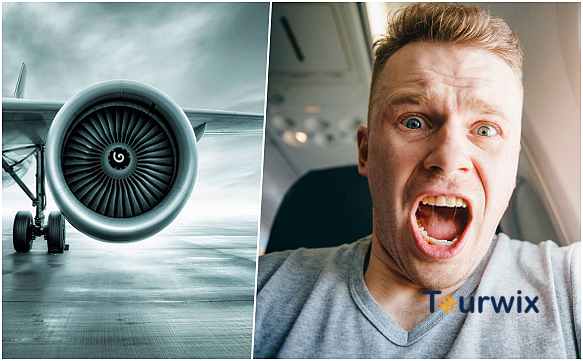
Travel Tips
12.01.2022 876
11 Facts To Help You Overcome Your Fear Of Flying!
While it is much faster to travel by plane today, many people still take the classic car ride out of fear of boarding the plane. Today, as Tourwix Travel & Airport Transfer, we tell you 11 things about planes and air travel that will help you reduce and maybe even overcome your fear of flying.
1. 2021 will be the safest year for air travel
For every billion passengers (passenger miles in traffic) flown by commercial aircraft, only 0.07 people die. For every billion kilometers traveled by car, 7.2 people die. In other words, the probability of dying on a plane is several times less than on a car ride.
In 2021, only 4 fatal plane crashes occurred with 81 deaths. This makes 2021 the safest year for air travel since 2017, when just one passenger plane crashed.
2. Aircraft undergoes extensive testing
Part of our fear of flying stems from a lack of confidence in the build quality of the aircraft. After all, cars, home computers and water heaters all break down, so why should an airplane be any different? you can think. However, this is not entirely the case.
-
Aircraft are extensively tested before being sold to airlines.
-
Blade bending test in which blades can be bent up to 90 degrees to ensure they withstand shear and turbulence.
-
An engine intake test that simulates water or bird inhalation into a jet engine.
-
Extreme temperature testing to ensure the aircraft can operate in extreme cold and extreme heat.
-
Virtual system testing to ensure aircraft electronics, software and components are working as intended.
-
Lightning simulation.
3. Aircraft are continuously maintained before flight
Do you think planes are as neat as cars? No. Commercial aircraft are among the best-maintained machines in the world. A typical aircraft requires at least 11 hours of maintenance for every hour in the air.
Typically, visual and fluid inspections are performed every other day, major maintenance inspections are performed weekly, and the entire aircraft is inspected every few years, with all access doors opened and parts removed for due care, cleaning, and repair. All of this maintenance makes the chances of mechanical failure during your flight extremely low.
4. Pilots are regularly tested by authorities
If your fear of flying is about pilots, commercial pilots are the most tried and followed professionals in the world.
First, most airlines' hiring procedures are very strict and thorough; This means that any pilot who is underqualified or has mental or physical problems can be eliminated before entering the cockpit. Your commercial pilot license (CPL) must be renewed every five years.
5. Airplanes have many safety features
In an airplane, the entire cabin is basically a giant safety cage designed to withstand 16 times the force of gravity. All floors are flame retardant and non-toxic, automatically add oxygen during decompression, and have emergency equipment such as flotation agents. They have a team of experienced, well-trained professionals who can guide you through any emergency.
6. Aircraft can land even if all engines fail at the time of flight
The aircraft's modern design is the result of centuries of aerodynamics. There are many documented cases of aircraft gliding safely for landing after an engine failure.
7. Airplanes aren't as dirty as you think they are
Concerns about cleanliness, especially since the pandemic, may serve as one of the reasons why I dislike air travel.
First, the air filtration and circulation systems on the plane are top notch. The air is renewed every few minutes on average, and the recovered air is passed through a HEPA filtration system that removes almost all contaminants. Airplanes are cleaned frequently too - if you have to wait at the airport gate to board your flight, it's probably because the cleaning staff are there.
8. Time-of-flight turbulence is not a hazardous event
Sudden changes in gravity and sudden aircraft vibrations in strong winds (e.g. turbulence) can unsettle even the calmest passenger, but don't worry.
Turbulence is simply the movement of air around the aircraft. He really can't afford to get hurt. Your plane isn't just designed to withstand turbulence that you can never really experience, but your pilots are also trained to take relatively simple steps to avoid and limit turbulence. They avoid turbulence simply by changing altitude to avoid strong winds.
9. Aircraft doors cannot be opened during flight
You might think some crazy people do crazy things on the plane. For example opening a cabin door during flight. But this is not possible.
Air Inside and Outside the Aircraft The pressure differential means approximately 24,000 pounds of pressure is applied to the cabin door. Not even the Hulk can move that door.
10. Aircraft engines are very durable
While an airliner can fly with only one engine and land safely even without the engine running, many people understandably worry about engine failures in flight. But modern engines can last 20-25,000 hours without major overhauls and are much more durable than you might think.
11. The probability of an airplane collision is zero
"There are hundreds of planes in the air, what if we collide?" If you're afraid, don't be afraid. Because the probability is zero. Because every plane is in close contact with air traffic control, which tracks every plane in the air and keeps them separate.
All planes are also equipped with a system called Traffic Collision Avoidance System (TCAS), which detects other objects around the plane and warns pilots so they can make in-flight adjustments.




.jpg)